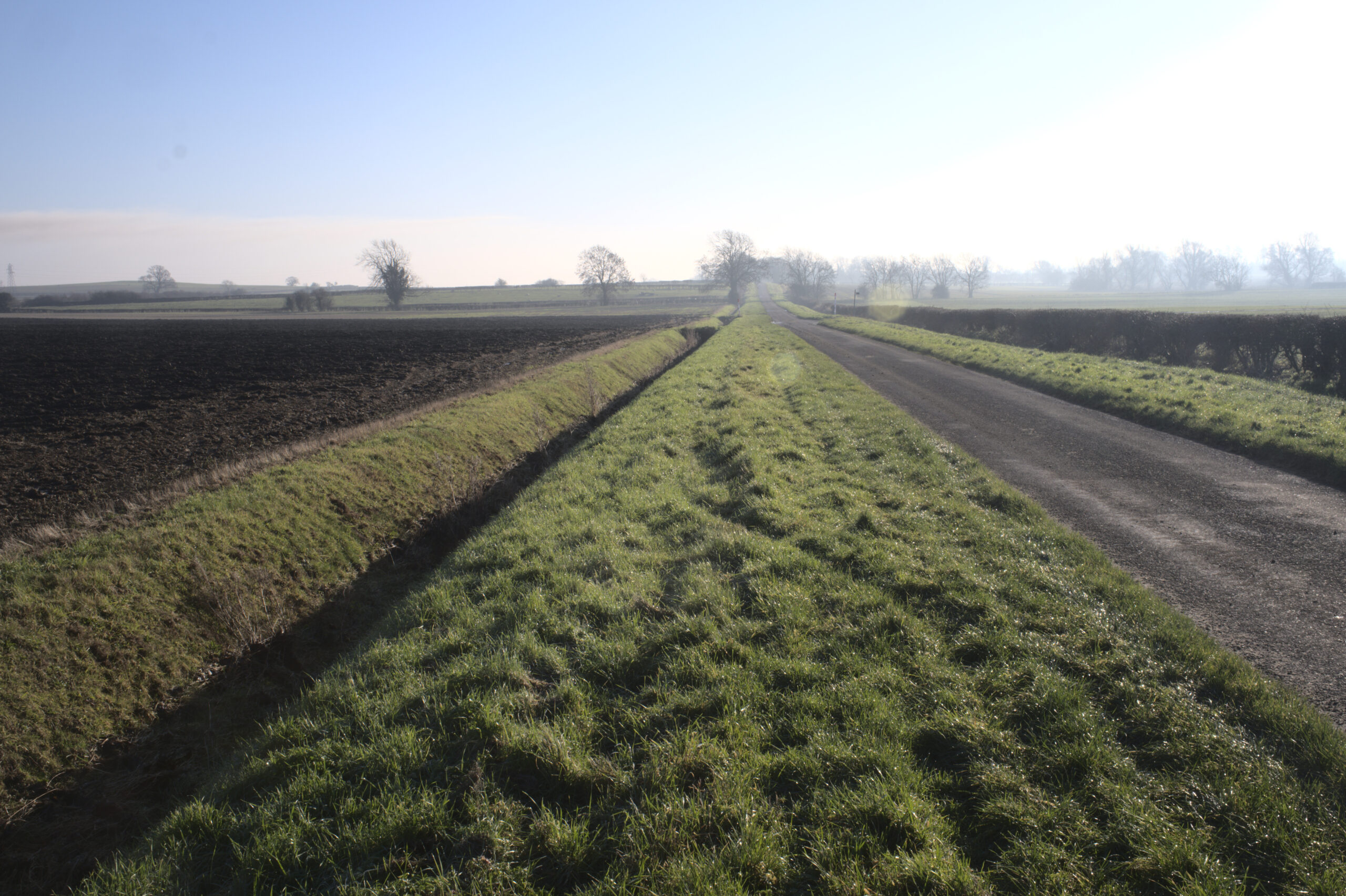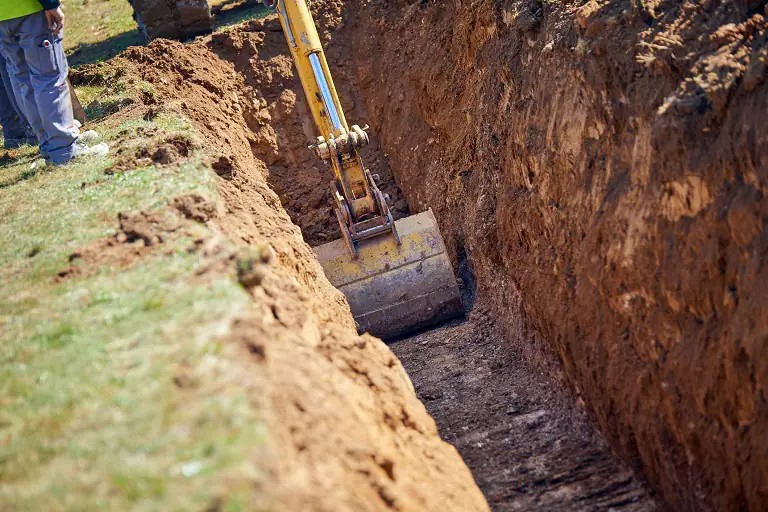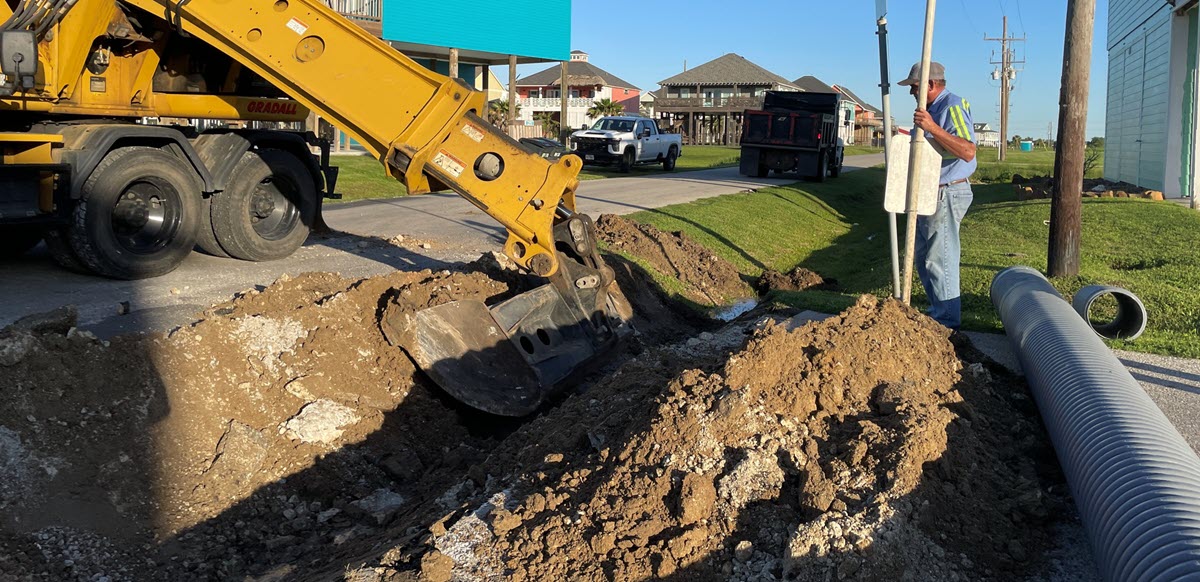Ditch Digging Servicesin Troy MI
Precision Ditching for Effective Water Drainage
We Are Locally Owned & Operated For Over 37 Years
Contact Us Today!
We Serve Businesses In And Around The Following Cities:
About Ditch Digging Services
Introduction
Looks may deceive, but infrastructure never lies; buried utilities, water management systems, and vital lines of communication all rest beneath our cityscapes – pivotal elements of a system that makes city life workable and enjoyable. Much attention is drawn to the towering structures that grace our skylines, yet it’s the intricate web of underground networks that truly govern the rhythm and pace of urban life. A seamless flow of utilities is what makes our modern conveniences possible and reliable, and unearthing this buried connection involves a process known as ditching. Today, we delve into the significance of ditching in the city of Troy for commercial properties, and how D&J Contracting, a resident ditching company, plays a critical role in shaping the city’s underground vitality.
Understanding the Process of Ditching
Ditching involves the excavation and removal of earth material to install, upgrade, or repair buried infrastructure. Pioneered by ditch digging companies, the procedure ensures proper drainage and enables the laying of utility lines that power the various operations in a city. D&J Contracting, a prominent ditch digging company in Troy, specializes in utility ditch digging and other ditch excavation services. The company’s expert team employs a meticulous process of surveying, planning, excavating, and refilling once the infrastructure is put in place. Each step is executed with exact precision, ensuring minimal disruption to the surrounding environment.
The Value of Ditching in Commercial Properties
For businesses with commercial properties, ditching services offer a plethora of benefits. A well-dug ditch can be a game-changer, providing efficient drainage and drastically reducing the risk of property damage from water accumulation. Additionally, utility ditch digging – when carried out by experts, like D&J Contracting – simplifies the process of embedding vital utility lines required for optimum business functionality.
With a forward-thinking ditch digging service near Troy, businesses are able to prepare for future utility expansions, reduce regulatory headaches and ensure a high return on property investments by maintaining sound infrastructure. Success stories abound in the city where seasoned businesses have invested in professional ditching services, subsequently flourishing thanks to the optimized utilities infrastructure that bolsters their commercial properties.
Real-World Applications of Ditching
In the city of Troy, ditching has played a central role in the overall development of commercial properties. The Troy Business Park, for instance, stands as a testament to the power of effective ditching. To ensure sustainable drainage and an intricate web of underground utilities, the park developers turned towards a trusted local partner – D&J Contracting’s ditch excavation services.
Working the ground, D&J Contracting deployed a comprehensive plan that involved carefully planned and precise excavations. Post implementation, the Business Park not only benefitted from effective drainage but also enjoyed reliable utilities, ultimately boosting the property’s value and attracting high-profile tenants.
Similarly, the sprawling Troy Shopping Center relied on expert ditch digging services during its expansive renovations. Without causing disruption, the underground network was revamped to accommodate newly added establishments, highlighting the important role ditch digging companies play in city development.
Make your Choice for Ditching Right, Make it D&J Contracting
With unpredictable weather patterns, expanding businesses, and increasing technological needs, the demand for superior ditching services is paramount. And in the context of Troy’s rapidly developing commercial landscape, D&J Contracting shines as a frontrunner in providing these key services. Their track record of developing and maintaining the city’s important infrastructure is tangible proof of their commitment and expertise.
The relevance and advantages of professional ditching are self-evident in the bustling life of the city of Troy. Solid infrastructural planning has significant economic benefits and the role of proficient ditch digging services in aiding this cannot be understated. Therefore, as commercial property owners look to the future, incorporating ditching as a pivotal part of their infrastructure planning will undoubtedly reap benefits in the long run.
We invite you to experience the professionalism and expertise that D&J Contracting brings to the table. Here in Troy, a city that masterfully blends the charm of history with the energy of modern business, D&J Contracting is ready to partner with you in making strategic business decisions and unveiling the immense potential that lies beneath your commercial properties.
Ditch Digging Services Gallery


Call Us Today to receive your Free Quote for
Ditching in Troy
Serving: Troy, Michigan

About Troy, Michigan
The earliest recorded purchases of land in what was known as Troy Township occurred in 1819. A couple of years later, a settlement known as Troy Corners was established due to Johnson Niles buying 160 acres in the region. The area is currently the north-central area of Troy. In 1827 Troy Township was established. In 1955, Troy was officially incorporated primarily as a strategy for preventing border cities from taking more land. This also helped to establish more robust city services for Troy residents, whose numbers increased rapidly during this time due to Detroiters fleeing the city for the surrounding suburbs.
It was named after Troy, New York and the ancient city of Troy as many of the early settlers, as in much of Michigan, originated from New York.
According to the United States Census Bureau, the city has a total area of 33.64 square miles (87.13 km), of which 33.47 square miles (86.69 km) is land and 0.17 square miles (0.44 km) (0.51%) is water.
| Census | Pop. | Note | %± |
|---|---|---|---|
| 1960 | 19,402 | — | |
| 1970 | 39,419 | 103.2% | |
| 1980 | 67,102 | 70.2% | |
| 1990 | 72,884 | 8.6% | |
| 2000 | 80,959 | 11.1% | |
| 2010 | 80,980 | 0.0% | |
| 2020 | 87,294 | 7.8% | |
| 2023 (est.) | 87,339 | 0.1% | |
| U.S. Decennial Census 2018 Estimate |
|||
According to a 2018 estimate, the median income for a household in the city was $96,864, and the median income for a family was $113,640. Males had a median income of $72,005 versus $52,365 for females. The per capita income for the city was $46,664. About 5.1% of families and 7.2% of the population were below the poverty line, including 6.7% of those under age 18 and 6.1% of those age 65 or over.
As of the census of 2020, there were 87,294 people, 33,822 households, and 24,300 families living in the city. The population density was 2,609.9 inhabitants per square mile (1,007.7/km). There were 34,953 housing units at an average density of 1,044.9 inhabitants per square mile (403.4/km). The racial makeup of the city was 62.2% White, 4.0% African American, 0% Native American, 27.3% Asian, 1.2% from other races, and 5.1% from two or more races. Hispanic or Latino residents of any race were 2.2% of the population.
There were 33,822 households, of which 35.4% had children under the age of 18 living with them, 60.1% were married couples living together, 8.3% had a female householder with no husband present, 3.4% had a male householder with no wife present, and 28.2% were non-families. 23.2% of all households were made up of individuals, and 10.1% had someone living alone who was 65 years of age or older. The average household size was 2.56 and the average family size was 3.05.
The median age in the city was 43.9 years. 20.7% of residents were under the age of 18; 8.8% were between the ages of 18 and 24; 32% were from 25 to 44; 28.6% were from 45 to 64; and 19.7% were 65 years of age or older. The gender makeup of the city was 50.5% male and 49.5% female.
| Race / Ethnicity (NH = Non-Hispanic) | Pop 2000 | Pop 2010 | Pop 2020 | % 2000 | % 2010 | % 2020 |
|---|---|---|---|---|---|---|
| White alone (NH) | 65,809 | 58,869 | 53,793 | 81.29% | 72.70% | 61.62% |
| Black or African American alone (NH) | 1,678 | 3,210 | 3,422 | 2.07% | 3.96% | 3.92% |
| Native American or Alaska Native alone (NH) | 105 | 124 | 108 | 0.13% | 0.15% | 0.12% |
| Asian alone (NH) | 10,713 | 15,439 | 23,788 | 13.23% | 19.07% | 27.25% |
| Pacific Islander alone (NH) | 18 | 1 | 9 | 0.02% | 0.00% | 0.01% |
| Other race alone (NH) | 79 | 125 | 312 | 0.10% | 0.15% | 0.36% |
| Mixed race or Multiracial (NH) | 1,373 | 1,502 | 2,908 | 1.70% | 1.85% | 3.33% |
| Hispanic or Latino (any race) | 1,184 | 1,710 | 2,954 | 1.46% | 2.11% | 3.38% |
| Total | 80,959 | 80,980 | 87,294 | 100.00% | 100.00% | 100.00% |
As of the census of 2010, there were 80,980 people, 30,703 households, and 22,443 families living in the city. The population density was 2,419.5 inhabitants per square mile (934.2/km). There were 32,907 housing units at an average density of 983.2 per square mile (379.6/km). The racial makeup of the city was 74.1% White, 4.0% African American, 0.2% Native American, 19.1% Asian, 0.6% from other races, and 2.0% from two or more races. Hispanic or Latino residents of any race were 2.1% of the population.
There were 30,703 households, of which 34.7% had children under the age of 18 living with them, 62.8% were married couples living together, 7.3% had a female householder with no husband present, 3.0% had a male householder with no wife present, and 26.9% were non-families. 23.4% of all households were made up of individuals, and 9.6% had someone living alone who was 65 years of age or older. The average household size was 2.63 and the average family size was 3.14.
The median age in the city was 41.8 years. 23.8% of residents were under the age of 18; 6.7% were between the ages of 18 and 24; 24% were from 25 to 44; 31.6% were from 45 to 64; and 13.8% were 65 years of age or older. The gender makeup of the city was 49.3% male and 50.7% female.
From the census of 2000, there were 80,959 people, 30,018 households, and 21,883 families living in the city. The population density was 2,413.9 inhabitants per square mile (932.0/km). There were 30,872 housing units at an average density of 920.5 per square mile (355.4/km). The racial makeup of the city was 82.30% White, 2.09% African American, 0.15% Native American, 13.25% Asian, 0.02% Pacific Islander, 0.36% from other races, and 1.82% from two or more races. 1.46% of the population was Hispanic or Latino of any race.
There were 30,018 households, out of which 36.9% had children under the age of 18 living with them, 64.5% were married couples living together, 6.0% had a female householder with no husband present, and 27.1% were non-families. 22.8% of all households were made up of individuals, and 7.8% had someone living alone who was 65 years of age or older. The average household size was 2.69 and the average family size was 3.23.
In the city 26.2% of the population was under the age of 18, 6.7% from 18 to 24, 29.8% from 25 to 44, 27.1% from 45 to 64, and 10.2% who were 65 years of age or older. The median age was 38 years. For every 100 females, there were 98.1 males. For every 100 females age 18 and over, there were 94.8 males.
From 1990 to 2000, of all of the municipalities in Oakland, Wayne, and Macomb counties, Troy had the highest numeric growth in the Asian population. It had 4,932 Asians according to the 1990 U.S. Census and 10,730 according to the 2000 U.S. Census, an increase of 5,798. The increase gave Troy the largest Asian-American population in the tri-county area, surpassing that of Detroit.
Troy uses the council–manager form of government, and thus is governed by a city council consisting of a mayor and six council members. The current mayor is Ethan Baker, who was elected to a four-year term on November 5, 2019. The city council appoints a City Manager, who manages the day-to-day operations of the city.
The City of Troy and City of Clawson on its southern border compose Michigan’s 41st District for State Representative. The district is currently represented by Padma Kuppa in the State House since 2019, and in the state Senate by Mallory McMorrow, since 2019. The district was previously represented in the State House by Martin Howrylak since 2013, and in the state Senate by Marty Knollenberg, since 2015. On the national level, Troy was part of the 9th district, represented by Joe Knollenberg from 1993 to 2009 and Gary Peters, who defeated Knollenberg in a highly publicized race in November 2008. Nationally, Troy is part of the 11th district, held by Democrat Haley Stevens.
Troy is the location of Walsh College, a business school, as well as branches of the University of Phoenix, Northwood University, Central Michigan University, Spring Arbor University, International Academy of Design and Technology, and Michigan State University.
There are seven school districts serving Troy; however, Troy School District serves the majority of the city limits. The district has multiple elementary schools, four middle schools, and two zoned high schools: Troy High School and Athens High School.
Three school districts have sizable portions of territory in Troy and operate at least one elementary school within the city: Avondale School District, in the north and northwestmost portion of the city; Birmingham City School District, in the southwestmost portion; and Warren Consolidated Schools, in the southeast, which operates Susick Elementary within the city. In addition, two other school districts are located in part in Troy but have no schools within the city limits: Bloomfield Hills School District, with a portion of the northwest part of the city, and Royal Oak School District, which has a very small portion of the southern part of the city. Finally, a small area of commercial property also in the south lies within the borders of Lamphere Public Schools
The Troy School District also hosts the eastern campus of the International Academy. Private schools include Bethany Christian School, Brookfield Academy, Oakland Children’s Academy, St. Mark Christian Academy and Troy Adventist Academy.
Call Us Today to receive your Free Quote for
Ditching in Troy
Related Services in Troy, Michigan
We Serve Businesses In The Following Zip Codes:
48007, 48015, 48021, 48026, 48035, 48036, 48038, 48042, 48043, 48044, 48045, 48046, 48047, 48048, 48050, 48051, 48066, 48071, 48080, 48081, 48082, 48083, 48084, 48085, 48088, 48089, 48090, 48091, 48092, 48093, 48098, 48099, 48225, 48230, 48236, 48310, 48311, 48312, 48313, 48314, 48315, 48316, 48317, 48318, 48397